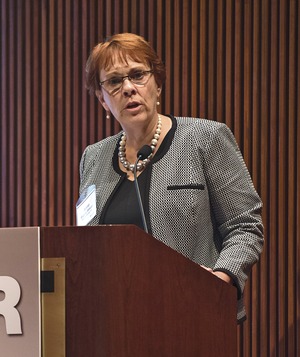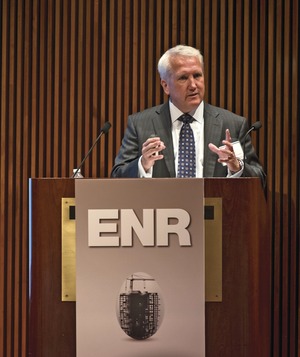

The perception of risk depends on where you live on the payment chain.
That point became painfully clear after Balfour Beatty Construction's Ed Littleton described the way he manages through the changing landscape of construction risk, including subcontractor defaults, from the point of view of a top construction manager. By the time the second keynote speaker at ENR's first Risk & Compliance Summit, Bigane Paving Co.'s Anne Bigane Wilson, took the podium to call for an end to subcontractor payment abuses, her conversation seemed to have as much to do with morality and the public good as with management.
The prompt payments that subs need to stay alive, she implied, were just as important as the risks to the prime contractor of subs going belly up.
The abusive pay practices deprive subcontractors of the funds they need to operate and take many forms, said Bigane Wilson. The practices include sitting on invoices, withholding final payments for years or inserting favorable dispute-forum-selection clauses.
Especially when the prime contractors' own retention has been reduced at the end of a project, "they [primes] have little skin in the game [and] all the money left goes to someone else, so they have no incentive to do the paperwork," Bigane Wilson said. For a few projects, she has been waiting for final payment for over seven years.
Fixing the Door
Few other subcontractors were present at the Sept. 20 conference in the McGraw Hill headquarters' auditorium in midtown Manhattan.
One of them was John Rapaport, general manager of Component Assembly Systems Inc., an interior wall and ceiling contractor based in Pelham, N.Y. He argued several times that he was prepared to provide detailed information to any prime contractor about work completed during the project, based on labor codes for each trade and other data, in order to justify reduced retainage.
"I'll come back and fix your door for 1%," he said.
Other problems weaken sub payment security, such as the owner dropping surety requirements on projects for which the prime has bought subcontractor default insurance, said Bigane Wilson. Pay problems add to the cost of all projects, she noted, and legislation is needed to correct the worst abuses.
In contrast, general contractors and construction managers devoted many comments to ways to protect themselves from the risks of subcontractor defaults.
When trouble with a subcontractor arises, said Doug Lareau, chief legal officer of Shawmut Design and Construction, "The first question I ask is, how much money are you holding on that sub?" Lareau said his concern was the anticipated cost of remedial measures.


Post a comment to this article
Report Abusive Comment